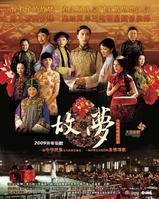So the dream can be watched online for free
In the life experiences of Lu Tian'en, we see a panorama of historical changes in China over the past hundred years. In 1904, he was born into a prominent family of imperial relatives in Beijing. His grandmother, Mrs. Lu, was a princess and his deceased grandfather was the nephew of Empress Dowager Cian. His maternal grandfather was a Mongolian prince. This illustrious family background meant that from birth, he carried an extraordinary destiny. Moreover, as the only son for several generations, he was treasured excessively and restricted, turning him into a caged bird adorned with fine clothes and food, unable and not daring to soar high.
When he was eight years old, there was a major change in the political situation: the Republic of China was established, and the Qing emperor abdicated. The Lu household was greatly affected, and its former glory disappeared. The identity of imperial relatives vanished. His father, Lu Zhengbo, who had previously served in court, now spent his days at home studying calligraphy and antiques. Mrs. Lu indulged in her dreams of past splendor, still regularly paying respects to the abdicated Emperor Puyi and the consorts, making this her life's focus. His mother, Mrs. Lu, managed the household with strictness, her personality and behavior style akin to a younger version of the old lady. Unknowingly, the young Lu Tian'en became a marginalized person during the transition between the old and new eras. The times underwent tremendous changes, the living environment fell into chaos, everything originally planned became obsolete, life lost direction, leaving him feeling lost. As a result, his mood became unstable, empty, without ideals or the will to strive.
At the age of twenty-four, he married his cousin Lingzhi at the behest of his grandmother. They had no feelings for each other. However, he developed a romantic relationship with Shui Piaoping, a singer of Jingyun Dagu (a form of traditional Chinese musical storytelling). But Shui Piaoping suffered from tuberculosis, which gradually became incurable. Coincidentally, Lingzhi died during childbirth on the same day. Both deaths occurred on the same day. Shui Piaoping’s death deeply saddened Lu Tian'en, while Lingzhi’s death cast a heavy shadow over the Lu household, severely affecting the health of the old lady.
At that time, Emperor Puyi was getting married and wanted to make some achievements after his marriage. He specially selected people like Zheng Xiaoxu, Luo Zhenyu, and Wang Guowei, appointing them as officials to work alongside existing imperial tutors such as Chen Baochen. Lu Tian'en's maternal grandfather and uncle, being enthusiastic about restoration, saw this as an opportunity and thus vigorously campaigned. Empress Dowager Duankang then hinted that Emperor Puyi should give Lu Tian'en the chance to serve in the palace. Naturally, the old lady was pleased, and Mrs. Lu, seeing their family fortunes declining, hoped her son could obtain an official position to revitalize the family business. Unexpectedly, Lu Zhengbo, who had experienced the late Qing bureaucracy, firmly opposed this. A serious conflict arose between mother, son, and wife. In the end, following Lu Zhengbo's advice, they politely declined the empress dowager's kindness.




